This Day In History - Jan 31st: The Death of Guy Fawkes (1606)

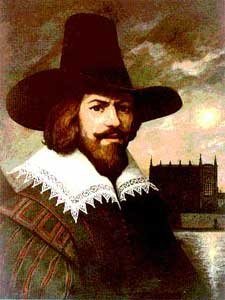
(Illustration of Guy Fawkes)
On January 31st 1606 at Westminster in London, Guy Fawkes, one of the chief conspirators in the plot to blow up the British Parliament building, jumps (or falls) to his death only moments before his execution for treason.
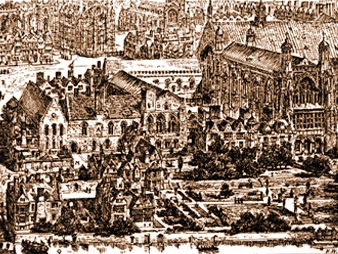
(The Houses of Parliament, as seen in the Time of James I, Artist and time unknown)
Catholicism
Catholicism in England was greatly repressed under Queen Elizabeth I, especially after the pope excommunicated her at 1570. Throughout her reign, heaps of priests were put to death, and Catholics could not even officially celebrate Mass or be married in accordance with their own rites. Because of this, many Catholics had high hopes when King James I took the throne on Elizabeth's death in 1603.
There were rumors, motivated by his diplomatic overtures to the pope also by the fact that his mother Mary Queen of Scots, was Elizabeth's catholic archrival, that James himself could become Catholic
It quickly became apparent, however, that James in now way supported religious clemency for Catholics. In 1604 he publicly denounced Catholicism as a fallacy, he decreed that all Catholic priests must leave England and expressed his distress that the number of Catholics was increasing. He also principally continued with the authoritarian policies of his predecessor, such as fines for persons who refused to attend Protestant services.
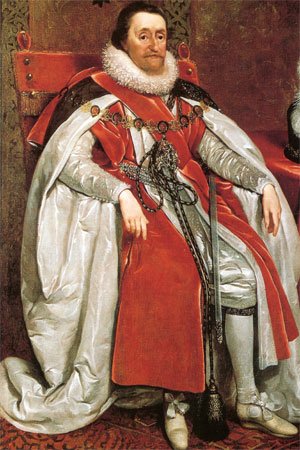
(Portrait of King James I)
A Plot
Angry English Catholics had arranged several failed conspiracies against Elizabeth, and these continued under James.
In May 1604, a handful of Catholic supporters - Guy Fawkes, Robert Catesby, Tom Wintour, Jack Wright and Thomas Percy, met at the Duck and Drake inn in London, where Catesby put forward a plan to implode the Houses of Parliament with gunpowder. Later, all five men allegedly swore an oath of utter secrecy upon a prayer book.
Eight more supporters later joined what is now called the 'Gunpowder Plot'. Although Catesby was the group's alleged leader, Fawkes has received most of the publicity over the past years. Fawkes was born in York, England in the year 1570. He spent nearly a decade fighting for Spain against persons opposed to Catholicism in the Spanish controlled Netherlands.
By 1605 Fawkes referred to himself Guido rather than Guy. He also called himself John Johnson while serving as the caretaker of a cellar (which was located just beneath the House of Lords) that the conspirators had leased for the purpose of stockpiling gunpowder.
According to the plan, Fawkes would light a fuse on November 5, 1605, during the opening of a new session of Parliament. King James, his oldest son, the House of Lords and the House of Commons would all be blown away (literally).
At the same time, Fawkes would be escaping by boat across the River Thames, and his fellow plotters would begin an uprising in the English Midlands, take James' daughter Elizabeth against her will, position her as a puppet queen and sometime thereafter marry her off to a Catholic man, thereby re-instituting the Catholic monarchy.
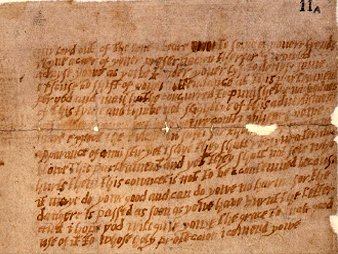
(Fragment of the Mounteagle Letter)
Caught
On October 26, an anonymous letter advising a Catholic sympathizer to cancel their appearance the State Opening of Parliament aroused the police suspicion to the presence of a plot. To this day, nobody really knows who wrote that letter.
Some historians have proposed that it had been faked and that the police had already known about the Gunpowder Plot, and had decided to let it play out in hopes of capturing more anti-protestant subjects. Around midnight on November 4th a search party discovered Fawkes lurking in his basement, with matches in his pocket as well as with 36 barrels of gunpowder stocked up beside him.
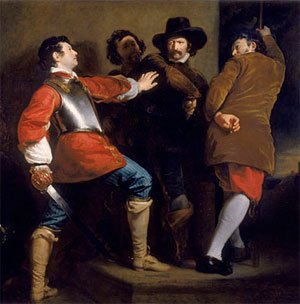
(Illustration of Fawkes being discovered)
Over the course of the next few months Fawkes was detained at the Tower of London and tortured into revealing the names of his co-conspirators and the full details of the plot. Fawkes at first stood his ground, not answering any questions put to him, however it is believed that he could not withstand the gruesome torturing he endured any longer which prompted him to dictate his confession and sign it.
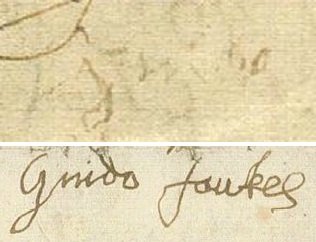
(This picture is evidence that Fawkes was tortured so horribly that he was barely able to sign his name when compared to an earlier signature)
Tracked Down,Tried,Hanged
The rest of Fawkes' co-conspirators were all caught and those who were still alive including Fawkes after a brief trial were found guilty of high treason and sentenced to death in January 1606 by hanging, drawing and quartering.
Quick Fact: Shortly before his execution on 31 January, Fawkes fell either intentionally or unintentionally from the scaffold where he was to be hanged and broke his neck, therefore evading the agony of the hangman's noose.
Notoriety
Guy Fawkes Day festivities soon spread up to the American colonies, where they became known as Pope Day. In Britain Guy Fawkes Day became a time to get together with family and friends, set off fireworks, light bonfires, attend parades and burn effigies of Fawkes. Children traditionally wheeled around their effigies demanding a "penny for the Guy" (a similar habit to Halloween trick-or-treating) and imploring audiences to "remember, remember the fifth of November."
Previously styled as a notorious traitor, he is now illustrated in certain circles as a revolutionary hero, mainly because of the effect of the 1980's graphic novel "V for Vendetta" as well as the 2005 movie of the same title, which portrayed a protagonist who would done a Guy Fawkes mask when fighting a future fascist government in Britain.
"Every generation reinvents Guy Fawkes to match their requirements," explained historian William B. Robison of Southeastern Louisiana University. "But Fawkes was merely one of the flunkies. It actually should be Robert Catesby Day."
1950 - Truman announces development of H-bomb
1865 - House passes the 13th Amendment
1953 - Flood wreaks havoc in Europe
1988 - Doug Williams leads Redskins to Super Bowl victory
1945 - The execution of Pvt. Slovik
Please leave a comment letting me know your thoughts on today's lead story and also let me know if I missed any historical events that happened today in the past personal or otherwise! Thanks for reading!
Sources:
Wikipedia
History.com